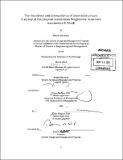| dc.contributor.advisor | Fiona Murray and Erika Wagner. | en_US |
| dc.contributor.author | Bhushan, Bharat, 1949- | en_US |
| dc.contributor.other | System Design and Management Program. | en_US |
| dc.date.accessioned | 2010-10-12T18:46:24Z | |
| dc.date.available | 2010-10-12T18:46:24Z | |
| dc.date.copyright | 2010 | en_US |
| dc.date.issued | 2010 | en_US |
| dc.identifier.uri | http://hdl.handle.net/1721.1/59224 | |
| dc.description | Thesis (S.M. in System Design and Management)--Massachusetts Institute of Technology, Engineering Systems Division, System Design and Management Program, 2010. | en_US |
| dc.description | Cataloged from PDF version of thesis. | en_US |
| dc.description | Includes bibliographical references (p. 56-57). | en_US |
| dc.description.abstract | Technological innovation is driven by incentives. However, our understanding of how incentives actually work "on the ground" to change the level of activity of innovators or to shape the direction of their innovation is relatively limited. This thesis contributes to this understanding by focusing on innovation prizes (as applied to the energy industry). It aims to examine how prizes provide a useful but also a limiting incentive for companies in a particular arena of R&D. Specifically, the thesis involves a survey of the teams that dropped out from a highly publicized prize competition to learn about their motivations and perspectives about the competition. How companies/teams understand and evaluate the technologies that they promote involves as much understanding of the technologies as of the economic models of incentives. This thesis uses a survey based methodology to explore the impact of a particular incentive structure - prizes - on a group of teams who initially participated in the prizes and then later decided to drop out. By selecting the drop out group we were able to explore the details of the prize as an innovation mechanism in more detail. The survey results reveal that the dropped out teams believed the prize to be an opportunity to raise money for their projects. Their inability to raise enough funds and eventual dropping out did not decrease their excitement about prizes as an ideal incentive to bring about radical change even though, the dropped out teams judged the specific prize competition as less than ideal. As a consequence, the thesis concludes that the prize incentive has a close relationship with and hence extends the financial infrastructure of a society. | en_US |
| dc.description.statementofresponsibility | by Bharat Bhushan. | en_US |
| dc.format.extent | 57 p. | en_US |
| dc.language.iso | eng | en_US |
| dc.publisher | Massachusetts Institute of Technology | en_US |
| dc.rights | M.I.T. theses are protected by
copyright. They may be viewed from this source for any purpose, but
reproduction or distribution in any format is prohibited without written
permission. See provided URL for inquiries about permission. | en_US |
| dc.rights.uri | http://dspace.mit.edu/handle/1721.1/7582 | en_US |
| dc.subject | Engineering Systems Division. | en_US |
| dc.subject | System Design and Management Program. | en_US |
| dc.title | The incentives and disincentives of innovation prizes : a survey of the dropout teams from Progressive Insurance Automotive X PRIZE | en_US |
| dc.title.alternative | Progressive Insurance Automotive X PRIZE | en_US |
| dc.type | Thesis | en_US |
| dc.description.degree | S.M.in System Design and Management | en_US |
| dc.contributor.department | System Design and Management Program. | en_US |
| dc.contributor.department | Massachusetts Institute of Technology. Engineering Systems Division | |
| dc.identifier.oclc | 666432619 | en_US |
